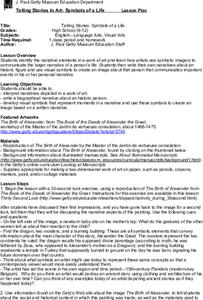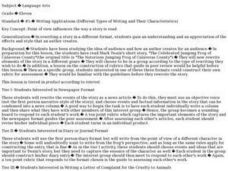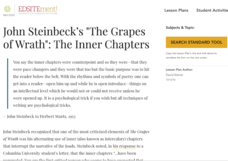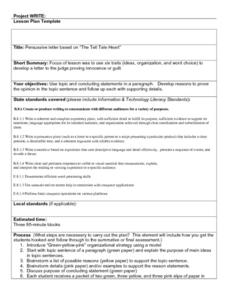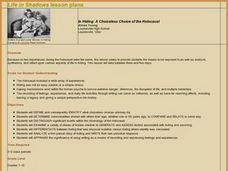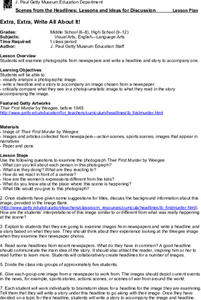Curated OER
Telling Stories in Art: Symbols of a Life
Through a series of activities, learners are exposed to how artists use symbolic imagery to create the narrative of a subject’s life. They study The Birth of Alexander and some manuscripts kept at J. Paul Getty Museum. They then draft...
Curated OER
Narrative vs. Expository Texts
Young scholars use examples of narrative and expository text to analyze and compare the two styles. Students read articles on life in Lesotho and Madagascar and use graphic organizers and discussion to compare them. Young scholars write...
Curated OER
Lesson: A Fitting Situation
In the Enemy's Country is a painting that depicts several Native Americans dressed and ready for war. Youngsters analyze the artistic and storytelling elements the artist used to convey his idea. They then write a creative piece from the...
Curated OER
Telling My Story: Conducting and Writing an Oral History
Students analyze the use of oral history as a way of gathering history. In this oral history lesson, students define oral history and then discuss researching immigration. Students research immigration. Students create questions for to...
Curated OER
Writing Applications: Different Types of Writing and Their Characteristics
Twelfth graders rewrite a story in a different format to understand the effects of the author's style. In this writing style lesson, 12th graders read Mark Twain's "The Celebrated Jumping Frog of Calaveras County" and rewrite the...
Curated OER
Stir Up a Character Analysis Recipe
What ingredients make up a character? A cup of honesty, a dash of humor, a pinch of cynicism? Based on real cookbooks they review in class, learners at any grade level three and up write recipes to describe characters familiar to your...
Curated OER
Study History through Journal Keeping
Journal writing can be a fun way to bring history to life. Upper graders read a series of journals from the time of the westward expansion, specifically the pioneer journey along the Oregon Trail. They compose an ongoing journal from the...
Curated OER
Lesson: Urs Fischer: Reviving the Past Art Movements
Seven major abstract art movements are analyzed by learners in groups. Each group analyzes various works by determining which work belongs to which movement. They then read Flatland, engage in an art and literary analysis discussion,...
National Endowment for the Humanities
John Steinbeck’s "The Grapes of Wrath": The Inner Chapters
Here’s a must-have resource for anyone using The Grapes of Wrath. Everything from guiding questions to background information, from photographs to documentary films, from activities to assessments is included in a richly detailed packet...
Curated OER
Nudging Questions
Students choose one topic to write about. They brainstorm ideas about their topic or incident. They use sensory details to visualize their topic. They answer a variety of teacher directored nudging question to help them describe their...
Curated OER
Autobiographical Talking Sticks
Students begin the lesson by developing a map of their lives. Individually, they take this information and write a personal narrative. They create symbols to represent the various times in their lives and introduce them into their...
Curated OER
Sequencing
Are you looking for a way to teach sequence of events in your narrative writing unit? Bring this lesson to your middle school class, as it prompts young writers to create a narrative sequence map of events that have happened at school...
Curated OER
Telling Stories: Symbols of a Life
Art and literature can go hand in hand, they both are used to express elements of the self in a creative and interesting way. Budding story tellers interpret and analyze the narrative elements they find in a work of art. They focus on...
Curated OER
Exploring the Narrative of an Enslaved African
Students evaluate the role of slave narratives as primary source documents and analyze the Narrative of the Life of Frederick Douglass for revelations about the lives of enslaved Africans during chattel slavery. They examine the role of...
Curated OER
My Alphabetical Autobiography
Design a pictorial autobiography using the letters of the alphabet. For each letter, writers select visual images that represent life events and interests. Younger writers add words or sentences of explanation while older writers narrate...
Curated OER
Outside The Castle
Students examine pictures of people who lived during the feudal system. In groups, they research the role and lifestyles of the nobility and commoners. To end the lesson, they draw their own fictional person and write their own narrative...
Curated OER
I Heard It Through the Grapevine
Students write a first-person narrative from the perspective of a runaway slave, or a historical character of the period, and present their story orally.
Curated OER
Illuminating Our Human Experiences: Soliloquy from Hamlet
Students determine the meaning of a soliloquy and examine the themes in Shakespeare's, Hamlet. For this literature lesson, students read Hamlet's soliloquy and watch a Photo Story 3 text model of such. They write a personal soliloquy...
Curated OER
Gandhi's Voice: Writing as Nonviolent Resistance
Ninth graders identify how Mahatma Gandhi used writing as a means of nonviolent communication. In this nonviolent resistance lesson, 9th graders watch a film about Gandhi as a writer and identify characteristics of nonviolent activism....
Curated OER
Persuasive Letters and The Tell Tale Heart
Students write persuasive letters based on "The Tell Tale Heart." They brainstorm topic sentences, main ideas, and details. They analyze the character and determine if he is innocent or guilty. They create a map listing their reasons to...
Curated OER
In Hiding: A Choiceless Choice of the Holocaust
Students read various examples of children who lived in hiding during the Holocaust. Using the texts, they identify commonalities between the children and create a timeline of events. They read a first person narrative of hiding and...
Curated OER
Extra, Extra Write All About It!
Learners examine photographs from newspapers and write a headline and story for one of the examples. In this news writing instructional activity, students analyze a photograph as a class and discuss it. Learners analyze photographs and...
Curated OER
Voices of Our People: A Patchwork of Cultures
Students view a gallery of photographs online and list objective and subject observations of the photos. They develop questions about the photos and write first person narratives about them.
University of Pennsylvania
Mock Trial of Alfred Dreyfus
What if scholars based mock trials on history? The fourth installment of a five-part series on the Dreyfus Affair asks learners to read various pieces of evidence before conducting a mock trial for a French officer. Teams answer...


